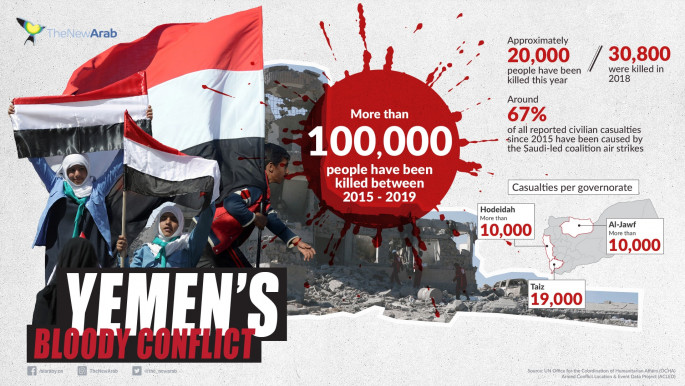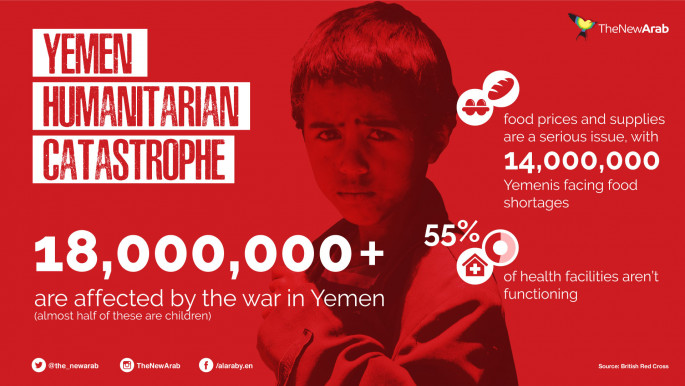Yemen in Focus: UAE changes its tune on Houthi rebels following Riyadh agreement
In 2015, the United Arab Emirates mobilised with its Saudi allies to spearhead a military campaign against Houthi rebels in Yemen, in what was marketed as a quick in-and-out job that would see the internationally recognised government restored after the rebel coup.
The ongoing war, which pits the Houthis against the government and its Gulf allies, has killed some 100,000 people since 2014 and brought the impoverished country to famine. However, after nearly five years of conflict, Abu Dhabi this week said rebels should have a role in Yemen’s future.
Anwar Gargash, minister of state for foreign affairs in the United Arab Emirates urged all sides to maintain momentum for a political solution after a recent peace deal between the government and southern separatists triggered optimism that the move could lead to a wider solution.
"Such an agreement must take account of the legitimate aspirations of all parts of Yemeni society. That includes the Houthis," Gargash said at a political conference in Abu Dhabi.
"Houthi militias have wreaked havoc on the country, but they are a part of Yemeni society and they will have a role in its future."
The comments are the latest conciliatory development in the long-running Yemen conflict, after the Houthis offered in September to halt attacks on Saudi Arabia, and a deal was signed in Riyadh last week between the government and separatists in the south.
Read more: UAE's true ambitions in Yemen take another blow
Gargash said he was hopeful that the power-sharing deal between the government and the secessionist Southern Transitional Council, could pave the way for a wider peace deal, though fears have been raised that the newly-formed alliance could sideline the Houthis.
"The agreement solidifies the anti-Houthi coalition and provides a more robust basis for reaching a political solution," he said. "Now we need to build on the momentum this has given us."
The Riyadh agreement stipulates Yemen's government return to Aden, and forces from both sides would be placed under the authority of the defence and interior ministries.
 |
Yemen's exiled government and southern separatists will host their first meeting in Riyadh on Thursday.
A spokesperson for the Southern Transitional Council (STC) released a statement confirming his group was set to enter further talks with the Saudi-based government of President Abedrabbo Mansour Hadi.
The talks will aim to "cooperate with President Hadi under the auspices and guarantee of the Arab Alliance, in order to improve services and address issues in the southern regions of the country", Nizar Haitham said.
Read more: Iran blasts Riyadh peace agreement as 'legitimising Saudi occupation in Yemen'
The crisis in Aden heightened in August, when the UAE-backed separatists took military control of the temporary capital from the government, after days of clashes, which saw dozens killed and injured from both sides. The Yemeni government accused Abu Dhabi of being behind the "insurgency."
Security Belt Forces - dominated by the STC - were behind the mini coup in Aden, which had served as the beleaguered government's base since it was ousted by the Houthi coup.
The clashes between separatists and government forces, who for years fought on the same side against the Houthis, had raised fears the country could further split into two entities.
At the time, the STC was accused of expelling internally-displaced Yemenis from the north of the country seeking refuge from the ongoing violence.
"We do believe among those migrating south there are some planted by certain political groups", Mohamed Alsahimi, deputy head of the STC's UK office told The New Arab at the time - accusing some refugees of being planted to instigate instability in the country’s south.
Shortly following the signing ceremony in Riyadh last week, Yemen’s foreign ministry announced on Saturday it will resume all work in its temporary capital of Aden, to begin Sunday, putting into action the power-sharing agreement.
The foreign ministry became the first government department to resume its operations in the southern port city since August, when all ministries were suspended due to the outbreak of fighting between government forces and the UAE-backed STC.
Yemen’s current Prime Minister Moeen Abdulmalik is expected to return imminently to the temporary capital Aden “with a small team”, according to local reports.
In a statement, the foreign ministry said the resumption of its operations in Aden comes at the direction of President Hadi, as part of the Saudi-brokered Riyadh Agreement, in a bid to end the north-south rift that has escalated during the country's war.
Hadi met with STC officials, including the group’s chief Aidarous al-Zubaidi, in Riyadh for the first time in Riyadh since 2017.
Iran’s response
Though the developments have been positively received as a step in the right direction, Iran - which backs the Houthi rebels in the north of Yemen, has slammed the peace deal, claiming it enforces the "Saudi occupation.”
"The Riyadh agreement between [Abedrabbo] Mansour Hadi's government and the separatist council is incomplete and will not solve the Yemen crisis and its problems," Iran’s foreign ministry said in a statement cited by the official IRNA news agency.
"The Yemeni people will not allow foreign forces to occupy southern Yemen," it added.
Ministry spokesman Abbas Mousavi said the agreement "does not provide any support to solve the problems in Yemen but comes in the context of promoting the Saudi occupation directly or through its forces to the southern part of the country".
Iran has for years been accused of militarily backing Houthi rebels who took over Yemen’s capital city Sanaa in September 2014, though it vehemently denies this and says it provides only political support.
More destruction
Despite the developments on the political field, destruction has yet to halt in Yemen. An international medical relief agency said on Thursday that a hospital it runs in western Yemen was damaged by a recent attack, causing the medical centre to be closed.
Yemeni military officials said Houthi rebels targeted buildings near the hospital with drones and missiles, causing huge explosions that killed at least eight people.
In a statement, Doctors Without Borders said there were no reports of deaths or injuries among its patients. They were transferred to other health facilities in the Red Sea city of Mocha.
Wadah Dobish, a spokesman for Yemen's internationally-recognised government, said the Houthi attack struck warehouses used by a government-allied force late on Wednesday, causing a huge fire.
Doctors Without Borders, also known as MSF, says its hospital opened in August last year, offering free services to war-wounded people and surgeries.
Abdel-Rahman Ahmed, a general doctor at the hospital, told The Associated Press that: "The patients fled after a huge explosion from the missile attacks on a weapons warehouse shook the area."
Dobish, the government spokesman, said the attacks targeted government-aligned forces known as the Giants Brigade. He said at least three Houthi drones also took part in the attack, which caused huge explosions and fires that spread to residential areas.
Mocha, historically famous for coffee exports, is in southern Hodeida province. The port in the capital city, also named Hodeida, is Yemen's most important entry point for international aid.
Read also: Iran blasts Riyadh peace agreement as 'legitimising Saudi occupation in Yemen'
The port has been the centre of year-long, UN-brokered negotiations since December for a durable ceasefire to prevent the suspension of crucial aid deliveries.
The ceasefire came months after forces backed by the United Arab Emirates began an assault to push the Houthi rebels out Hodeida in June 2018.
Wednesday's escalation could jeopardise the UN deal, criticised by observers as vague and hard to implement.
The hospital in Mocha is basically the only functioning facility providing support to thousands of severely malnourished children, either from Mocha or the large displaced community who fled to Mocha over the past year to escape fighting in other areas.
Sana Uqba is a journalist at The New Arab.
Follow her on Twitter: @Sanasiino
Yemen In Focus is a new, regular feature from The New Arab.





 Follow the Middle East's top stories in English at The New Arab on Google News
Follow the Middle East's top stories in English at The New Arab on Google News


